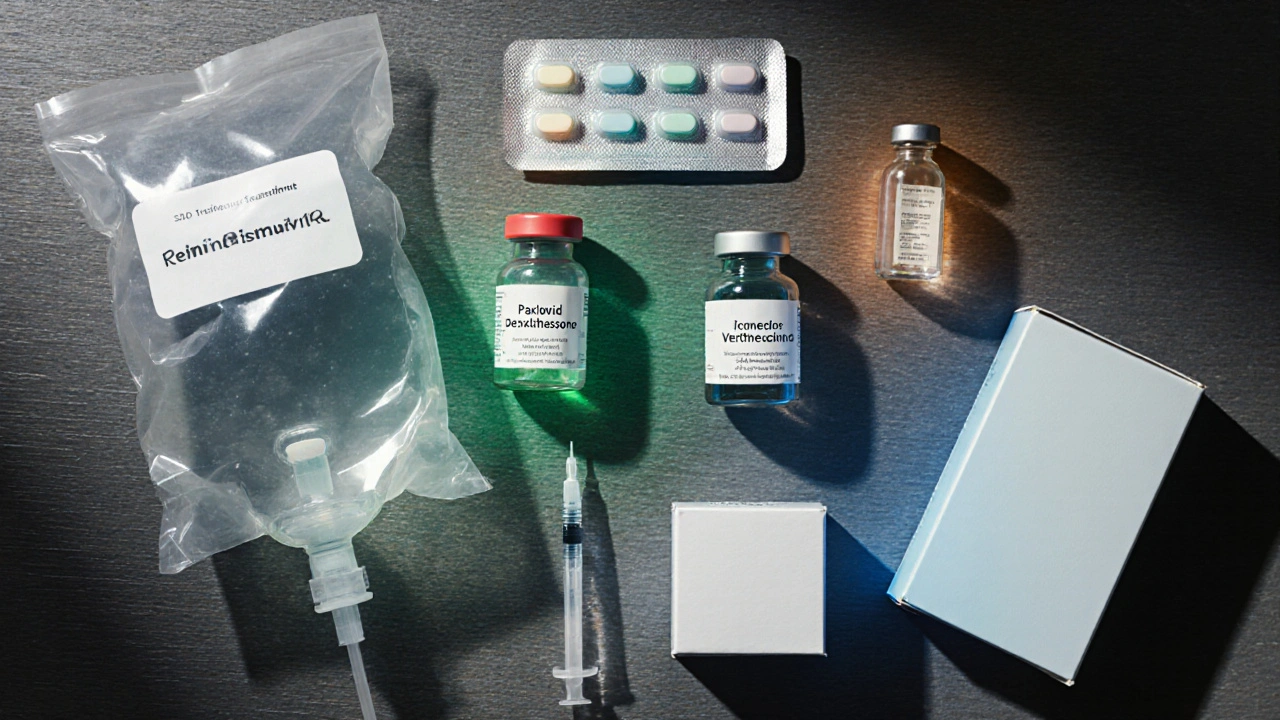COVID-19 Treatment Recommendation Tool
Treatment Selection Calculator
Key Takeaways
- Hydroxychloroquine shows limited benefit for COVID‑19 and carries cardiac risks.
- Remdesivir and Paxlovid have the strongest evidence for reducing hospitalization.
- Dexamethasone is the go‑to anti‑inflammatory for patients needing oxygen.
- Ivermectin and azithromycin lack convincing data and are not recommended by major guidelines.
- Cost, availability, and patient risk factors should drive the choice of therapy.
When the pandemic first hit, hydroxychloroquine is an antimalarial drug that was quickly repurposed in hopes of treating COVID‑19. Over the months, dozens of other antivirals and anti‑inflammatories entered the conversation. If you’re looking at treatment options today, you need a clear picture of how hydroxychloroquine stacks up against the alternatives that have survived rigorous testing.
What Is Hydroxychloroquine?
Hydroxychloroquine (HCQ) is a synthetic derivative of chloroquine, originally approved for malaria prophylaxis and autoimmune conditions like lupus and rheumatoid arthritis. Its mechanism involves raising the pH inside cellular compartments, which can interfere with virus entry in lab settings. However, clinical trials in COVID‑19 patients have repeatedly shown modest or no benefit, while highlighting a risk of QT‑interval prolongation and arrhythmias, especially when combined with azithromycin.
Major Alternatives on the Market
Below are the most widely discussed alternatives, each with its own evidence base and safety profile.
- Remdesivir is an intravenous nucleotide analogue that inhibits viral RNA polymerase. Approved for hospitalized patients, it shortens recovery time in moderate disease.
- Paxlovid is a combination of nirmatrelvir (protease inhibitor) and ritonavir (pharmacokinetic booster). Oral, 5‑day regimen, shown to cut hospitalization risk by ~90% when started early.
- Molnupiravir is a ribonucleoside analogue that induces error catastrophe in viral RNA. Works for mild‑to‑moderate cases, but efficacy is lower than Paxlovid.
- Dexamethasone is a corticosteroid that dampens the hyper‑inflammatory response often seen in severe COVID‑19. Reduces mortality in patients on supplemental oxygen or ventilators.
- Ivermectin is an antiparasitic that gained attention after early in‑vitro studies suggested antiviral activity. Large, well‑designed trials have not confirmed a clinical benefit.
- Azithromycin is a macrolide antibiotic sometimes paired with hydroxychloroquine for presumed synergistic effects. No clear improvement in outcomes, plus added cardiac risk.
- Cytokine Storm is an uncontrolled release of inflammatory cytokines that can lead to multi‑organ failure in severe COVID‑19. Targets include steroids and selective cytokine blockers.

How We Compare Them
To make sense of the data, we look at five core criteria:
- Efficacy: reduction in hospitalization, mortality, or symptom duration.
- Safety: incidence of serious adverse events, especially cardiac or hepatic.
- Administration: oral vs. intravenous, treatment duration, need for monitoring.
- Cost & Availability: price per course, insurance coverage, supply constraints.
- Guideline Support: recommendations from WHO, NIH, or local health authorities.
Side‑by‑Side Comparison Table
| Drug | Efficacy (Hospitalization reduction) | Serious Adverse Events | Route & Duration | Cost (USD per typical course) | Guideline Rating |
|---|---|---|---|---|---|
| Hydroxychloroquine | 0-10% (no consistent benefit) | QT prolongation, retinal toxicity (rare) | Oral, 5‑10 days | ≈$5-$15 | Not recommended (NIH, WHO) |
| Remdesivir | ≈15% reduction in time to recovery | Elevated liver enzymes, infusion reactions | IV, 5‑10 days | ≈$2,500 (full course) | Conditional recommendation for hospitalized patients |
| Paxlovid | ≈90% reduction when started ≤5 days of symptoms | Drug-drug interactions, taste disturbance | Oral, 5 days | ≈$530 (per course) | Strong recommendation for high‑risk outpatients |
| Molnupiravir | ≈30% reduction in hospitalization | Minimal, mild gastrointestinal upset | Oral, 5 days | ≈$700 | Conditional recommendation when Paxlovid unavailable |
| Dexamethasone | ≈20% mortality reduction in ventilated patients | Hyperglycemia, secondary infection | Oral/IV, 6‑10 days | ≈$10-$30 | Strong recommendation for patients requiring oxygen |
| Ivermectin | Not demonstrated | Neurotoxicity at high doses | Oral, 1‑3 days | ≈$2-$5 | Not recommended |
| Azithromycin | No clear benefit | QT prolongation, GI upset | Oral, 3‑5 days | ≈$5-$12 | Not recommended for COVID‑19 alone |
When Might Hydroxychloroquine Still Have a Role?
Even with lukewarm data, certain niche situations keep HCQ on the table:
- Patients already on HCQ for lupus who contract mild COVID‑19 - stopping might trigger a flare.
- Low‑resource settings where newer antivirals are unavailable and cardiac monitoring is feasible.
In these cases, clinicians must weigh the modest, uncertain benefit against the well‑known cardiac risk, and obtain baseline ECGs.
Practical Guidance for Clinicians and Patients
1. Check the latest national guidelines. Recommendations evolve with emerging variants. 2. Assess patient risk. Age, comorbidities, and vaccination status determine who benefits most from antivirals. 3. Prioritize drugs with strong evidence. Paxlovid and dexamethasone dominate the treatment algorithm. 4. Monitor for interactions. Paxlovid, for example, interacts with many statins and anti‑arrhythmics. 5. Document consent. When prescribing off‑label or low‑evidence options like HCQ, ensure the patient understands the uncertainties.
Potential Pitfalls and Misconceptions
Many people still recall early headlines that hailed hydroxychloroquine as a "miracle cure." Those reports ignored the need for randomized control trials. Today, the consensus is clear: the drug does not reliably prevent severe disease and can cause dangerous heart rhythm changes, especially when combined with other QT‑prolonging agents.
Another common myth is that ivermectin works if you take a higher dose. Higher doses increase neurotoxicity without improving outcomes - a classic risk‑benefit mismatch.
Future Directions
Research continues into oral protease inhibitors that could outperform Paxlovid, as well as next‑generation monoclonal antibodies that retain activity against new variants. Hydroxychloroquine is unlikely to re‑emerge unless a well‑designed trial identifies a specific subgroup that truly benefits.
Frequently Asked Questions
Does hydroxychloroquine prevent COVID‑19 infection?
Large prevention trials have shown no statistically significant reduction in infection rates. It is not recommended for prophylaxis.
What is the first‑line oral therapy for mild COVID‑19?
Paxlovid is the preferred oral antiviral for high‑risk patients if started within five days of symptom onset. Molnupiravir is an alternative when Paxlovid is contraindicated.
Can I take hydroxychloroquine with azithromycin?
Combining them increases the risk of heart rhythm problems and offers no proven benefit. Most guidelines advise against the combo.
When should dexamethasone be used?
Dexamethasone is indicated for patients who need supplemental oxygen or are on ventilators. It does not help mild cases that do not require oxygen.
Is ivermectin effective for COVID‑19?
Current high‑quality evidence does not support its use. Major health agencies advise against prescribing ivermectin for COVID‑19 outside of clinical trials.


Matt Miller
October 14, 2025 AT 12:57Hydroxychloroquine’s data just doesn’t hold up against Paxlovid or dexamethasone.
For most patients the newer antivirals cut hospital stays and deaths dramatically.
Keep an eye on the latest NIH guidelines for the best choices.
Tristan Francis
October 22, 2025 AT 15:08The pharma giants push Paxlovid and hide the cheap HCQ tricks.
They want you to spend more while the cheap drug sits on shelves.
Don’t trust the mainstream hype.
Keelan Walker
October 30, 2025 AT 16:19From a clinician’s point of view the treatment landscape has changed dramatically over the past two years 🙂
When you look at the numbers Paxlovid consistently shows a 90% reduction in hospitalization for high‑risk patients when taken early
Remdesivir still has a place in the hospital setting because it shortens recovery time even though it’s an IV drug
Dexamethasone remains the cornerstone for anyone on supplemental oxygen or a ventilator and it saves lives without costing much
Hydroxychloroquine, on the other hand, has not demonstrated a reliable benefit in any large randomized trial and its cardiac risks are well documented
The QT‑interval prolongation is a real concern especially when combined with other meds that affect the heart
In low‑resource settings where Paxlovid or remdesivir are unavailable some clinicians still consider HCQ as a stop‑gap, but only with careful ECG monitoring
Even then the modest antiviral effect is outweighed by the potential for arrhythmias in vulnerable patients
For outpatients who are vaccinated and have no comorbidities the benefit of any antiviral is marginal compared to simply monitoring and supportive care
That’s why guidelines now prioritize oral antivirals for high‑risk groups while recommending steroids for those who need oxygen
Cost is also a major factor – HCQ is cheap but the hidden costs of monitoring can make it more expensive overall
New oral protease inhibitors are in the pipeline and may eventually surpass Paxlovid in efficacy and safety
Until then the best practice is to follow the evidence‑based recommendations from WHO and NIH
Remember that the goal is to reduce severe disease, not just to add another pill to the regimen
Patients should always discuss the risks and benefits with their healthcare provider before starting any therapy 😷
Staying updated with the latest trial data is the smartest move you can make as a patient or a clinician
Heather Wilkinson
November 7, 2025 AT 18:30Great summary, thanks for breaking it down so clearly! 😊
April Conley
November 15, 2025 AT 20:41HCQ is a relic its risks outweigh any unproven benefit and health systems should move on.
Bruce Heintz
November 23, 2025 AT 22:52Totally agree – focusing on proven treatments saves lives and resources 😊
richard king
December 2, 2025 AT 01:03The theater of COVID therapeutics has become a circus of false hope and glittering pseudoscience; HCQ strutted onto the stage like a desperate magician, but its tricks fell flat under the harsh spotlight of rigorous trials, leaving only the bitter taste of cardiac danger and shattered expectations.
Dalton Hackett
December 10, 2025 AT 03:14The comparative efficacy table clearly illustrates that Paxlovid outperforms hydroxychloroquine by a substantial margin in preventing hospitalizations.
While HCQ’s efficacy hovers between zero and ten percent, Paxlovid consistently achieves around ninety percent reduction when administered early.
Moreover, the safety profile of Paxlovid, aside from drug‑drug interactions, is considerably more favorable than the QT‑prolongation risks associated with HCQ.
Cost considerations also favor the newer antivirals despite higher upfront prices, because they reduce downstream expenses linked to severe disease management.
Guideline committees such as the NIH and WHO have therefore relegated HCQ to a non‑recommended status, recommending instead agents with robust clinical trial support.
Clinicians must also weigh patient-specific factors; for example, individuals already on HCQ for autoimmune conditions may continue therapy under close cardiac monitoring.
In summary, the weight of evidence tilts decisively toward modern antivirals and corticosteroids for appropriate disease stages.
This shift reflects both scientific rigor and practical outcomes observed across diverse populations.
Grace Shaw
December 18, 2025 AT 05:25While I appreciate the thorough analysis presented, I must emphasize that adherence to the most current clinical guidelines remains paramount; deviations based on anecdotal preference can jeopardize patient safety and contravene the standards set by governing health authorities.
Henry Clay
December 26, 2025 AT 07:35The push for cheap, unproven drugs is a disgrace to science and a betrayal of public trust 😡
Paula Hines
January 3, 2026 AT 09:46America doesn’t need foreign pharma dictating our meds we should trust our own doctors and keep HCQ off the shelves
michael santoso
January 11, 2026 AT 11:57It is evident that the discourse surrounding COVID therapeutics is saturated with hyperbole, yet a measured appraisal privileges data over sensationalism.